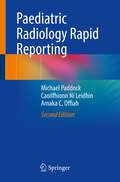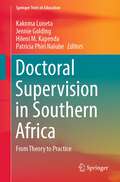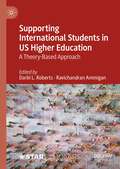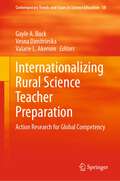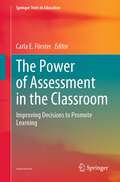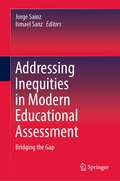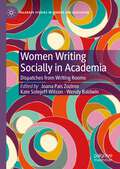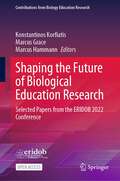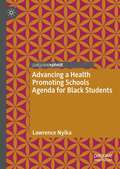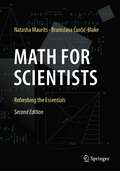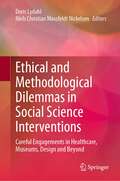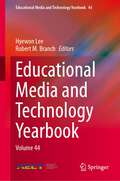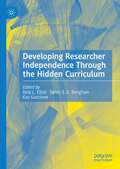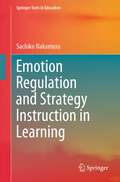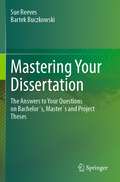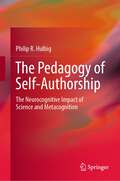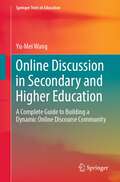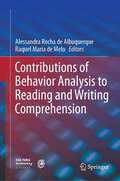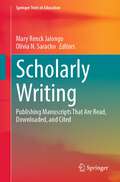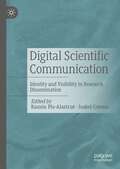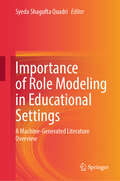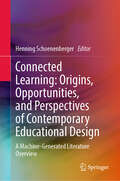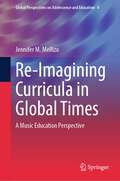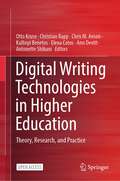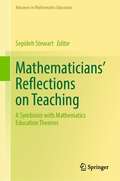- Table View
- List View
Paediatric Radiology Rapid Reporting
by Michael Paddock Amaka C. Offiah Caoilfhionn Ní LeidhinThere is a narrow margin between pass and fail in the notably demanding Rapid Reporting component of the Fellowship of the Royal College of Radiologists (FRCR) Part 2B examination. This book provides readers with a comprehensive evaluation of paediatric radiographs, not only for those preparing for this examination but for all those who report them in their clinical practice. The overriding principle remains the same regardless of background – safe radiographic interpretation. Prospective candidates may have only had limited opportunity to report paediatric imaging, which may have been some time before they attempt the examination. Whilst other resources provide only a limited selection of paediatric radiographs, this book is solely dedicated to improving skill and knowledge in paediatric reporting. This text has been meticulously crafted to bridge any gaps in knowledge, while addressing deficiencies repeatedly identified in the FRCR Part 2B Examiners’ Reports in that “many candidates struggle with interpretation of paediatric imaging—even for common paediatric pathologies” and that “knowledge of normal appearances on paediatric plain images…was particularly poor in the Rapid Reporting”. This new edition has been extensively revised and contains 3 new tests. This unrivalled educational resource now comprises nearly 400 practice paediatric radiographs which is unique to the marketplace. The range of cases, from neonate to adolescent, deliver a sound knowledge of common paediatric fracture patterns and pathologies which enables readers to confidently differentiate between normal and abnormal. The much-lauded explanations accompanying these high-quality imaging tests remain robust and accurate, allowing candidates to maximise their preparation for all facets of the FRCR 2B examination and beyond. Foreword by Professor Derek Roebuck
Doctoral Supervision in Southern Africa: From Theory to Practice (Springer Texts in Education)
by Kakoma Luneta Jennie Golding Hileni M. Kapenda Patricia Phiri NalubeThis book offers a unique perspective on doctoral supervision in southern Africa, showcasing the potential of scholarly reflection. The aim is to share the benefits with a wider audience, catalyzing the use of scholarly literature in global doctoral supervision. By drawing on the field's literature, it fosters informed and systematic reflection to transform supervision. With a focus on deep development and affordability, this book presents a model that enhances the quality of doctoral graduates. It builds on collaborative work and analysis of supervision experiences, engaging with key literature and exploring facets of practice. Through personal exemplifications, authors highlight complexities and commonalities across cultural contexts, inspiring systematic improvement in supervision.A valuable resource for academics, researchers, and practitioners involved in doctoral supervision, this book provides evidence-based insights and creative approaches to pedagogy. It encourages the systematic enrichment of doctoral supervisors worldwide.
Supporting International Students in US Higher Education: A Theory-Based Approach
by Darbi L. Roberts Ravichandran AmmiganThis book explores the integral role that student affairs professionals play in the success of international students at higher education institutions in the US. International student support has often been thought of as the principal responsibility of international student services offices, but research suggests that international student engagement in the broader university community, and support for them by all student affairs and services offices on campus, is closely tied to persistence and retention. The authors explore a student development theory-based approach to supporting the experience and success of international students from all facets of student affairs and services. The book explores practical and strategic implications of a more integrative approach to international student support both inside and outside of the classroom, while also utilizing a critical lens in applying models that were originally built for predominantly white institutions and US citizens.
Internationalizing Rural Science Teacher Preparation: Action Research for Global Competency (Contemporary Trends and Issues in Science Education #58)
by Gayle A. Buck Vesna Dimitrieska Valarie L. AkersonThis edited volume discusses the need to increase quantity and enhance quality of science education focused on preparing rural students to thrive in an interconnected, interdependent, and complex world. It acknowledges that globally integrated education incorporates local knowledge and culture with global trends. Additionally it highlights globally competent science teaching is not included in most preparation programs, and teachers enter schools unprepared to address students’ needs. Rural schools lack opportunities to keep up with reform efforts and may have limited experiences with diversity, particularly at the global level. These chapters describe globalization in authors’ respective academic institutions by sharing global competence action research projects for preservice teachers. The studies presented were conducted in elementary and secondary science methods, and science content courses. The book’s research is unique as the contributors have carried out action research in science teacher preparation programs and participated in peer discussions that helped them fill gaps in global science teaching while advancing the field of teacher preparation programs.
The Power of Assessment in the Classroom: Improving Decisions to Promote Learning (Springer Texts in Education)
by Carla E. FörsterThis textbook addresses the main assessment issues that teachers and educational institutions face in their daily work, while providing practical tools to support actions and decisions in this area. The critical issues observed in the assessment practices are made visible and specific guidelines and examples are given on how to carry out an effective and realistic classroom assessment within the school context.The book reveals evaluation elements that future and practicing teachers need to know about and can benefit from, such as the alignment between curriculum, teaching and assessment, flexibility in the construction of instruments according to their purpose, effective feedback, rubrics to evaluate performance and the use of specification tables to make pedagogical decisions (beyond the construction of the instruments itself).Translation from the Spanish language edition: El Poder de la Evaluación en el Aula. Mejores Decisiones para Promover Aprendizajes by Carla E. Förster Marín, © Ediciones UC 2018. Published by Ediciones UC. All Rights Reserved.
Addressing Inequities in Modern Educational Assessment: Bridging the Gap
by Jorge Sainz Ismael SanzThis edited book focuses on the central and up-to-date issues that represent some of the most relevant challenges and limitations of International Learning Assessments (ILSAs). It specifically sheds light on the general effects of the discontinuation of face-to-face education on students at diverse academic levels during the COVID-19 pandemic.Through the lens of the most relevant experts of the field, it highlights the asymmetric effects on students based on family income, education level, or employment, imposing a heavy toll on those with less resources.It raises issues regarding the impact on the mental health of students and education professionals due to school closures. Modern education is shifting its focus from just scores to detailed, qualitative feedback. Such comprehensive insights help students identify both strengths and growth areas, making assessments more constructive.This book is aimed for researchers in the field of educational assessments, graduate and postgraduate students, policy makers, and anyone interested in making informed decisions regarding ILSAs. COVID-19 brought immense educational challenges, it also presented an unprecedented opportunity: to reassess and reform existing systems, steering towards assessments that are both fair and empowering.
Women Writing Socially in Academia: Dispatches from Writing Rooms (Palgrave Studies in Gender and Education)
by Joana Pais Zozimo Kate Sotejeff-Wilson Wendy BaldwinThis book offers a multifaceted perspective on social writing in a volatile, uncertain and complex world. It meets the need to enable women’s capacity, especially in academic settings, to structure their own writing practice and that of others in the community. It expands current research on social writing beyond its core context in English-speaking countries to multilingual contexts from Portugal to Finland, identifying fruitful areas for interdisciplinary research, nexuses of social practice, and strategies for situated social learning through a feminist lens, bringing women from the margins to the centre. As the average woman academic with children is losing an hour of research and writing time every day in the aftermath of the Covid-19 pandemic, the impact of which will be felt for decades, the book purposefully entwines these polyphonic voices to tell the story of a writing retreat as a space for leadership and empowerment.
Shaping the Future of Biological Education Research: Selected Papers from the ERIDOB 2022 Conference (Contributions from Biology Education Research)
by Konstantinos Korfiatis Marcus Grace Marcus HammannThis open access volume is a collection of full papers based on the peer-reviewed presentations accepted for the European Researchers in Didactics of Biology, ERIDOB 2022 conference. ERIDOB aims to bring together researchers in didactics of Biology from Europe and around the world to share and discuss their research work and results. It is the only major international conference whose focus lies exclusively on biology education research, and all the papers are written by international researchers from across Europe (and beyond) which report on a range of contemporary biology education research projects. They are all entirely new papers describing new research in the field. Each paper has been peer-reviewed by experienced biology education researchers and the members of the ERIDOB Academic Committee. The selected papers are collated within the following categories of biology education: · Teaching Strategies and Learning Environments · Students’ Knowledge, Conceptions, Values, Attitudes and Motivation · Outdoor and Environmental Education · Biology Teachers’ Professional Development By providing a collection of new research findings from many countries, this book is a great resource for researchers and practitioners such as school, college and university biology teachers' around the world. It is useful for training biology teachers and therefore valuable to teacher training institutions.
Advancing a Health Promoting Schools Agenda for Black Students
by Lawrence NyikaThis book centralizes the importance of using culturally relevant models within health promoting schools (HPS) to promote the participation of Black students. In current HPS models Black students are often overlooked. The author presses beyond the mainstream, science-focused research on HPS to grapple with issues of power, prejudice, and oppression and focus on the social determinants of health. By focusing on social constructs as a constraint to Black students’ wellbeing (rather than only disease), chapters present a multidimensional whole-school intervention aimed at comprehensively bridging the empowerment gap between Black students and historically privileged students.
Math for Scientists: Refreshing the Essentials
by Natasha Maurits Branislava Ćurčić-BlakeThis book reviews math topics relevant to non-mathematics students and scientists, but which they may not have seen or studied for a while. These math issues can range from reading mathematical symbols, to using complex numbers, dealing with equations involved in calculating medication equivalents, the General Linear Model (GLM) used in e.g. neuroimaging analysis, finding the minimum of a function, independent component analysis, or filtering approaches. Almost every student or scientist, will at some point run into mathematical formulas or ideas in scientific papers that may be hard to understand, given that formal math education may be some years ago. In this book we will explain the theory behind many of these mathematical ideas and expressions and provide readers with the tools to better understand them. We will revisit high school mathematics and extend and relate this to the mathematics you need to understand the math you may encounter in the course of your research. This book will help you understand the math and formulas in the scientific papers you read. To achieve this goal, each chapter mixes theory with practical pen-and-paper exercises such that you (re)gain experience with solving math problems yourself. Mnemonics will be taught whenever possible. To clarify the math and help readers apply it, each chapter provides real-world and scientific examples.In this new edition, two new chapters covering statistics and differential equations have been added, which have been workshopped in the 'authors' popular lecture series in order to maximize the benefit for readers.
Ethical and Methodological Dilemmas in Social Science Interventions: Careful Engagements in Healthcare, Museums, Design and Beyond
by Doris Lydahl Niels Christian Mossfeldt NickelsenThis book develops an understanding of researchers' engagements with their subjects as a generative mode of knowledge production that takes place between researchers and their research fields. It promotes the idea that rather than value neutrality, caring may be helpful when a researcher makes suggestions for improvement and constructs interventions. The authors reflect on questions such as how researchers take can sides without taking a fundamental principle of action for granted. What tensions and obstacles do researchers meet while they strive to engage carefully? How do careful engagements affect academic work and output? What inequalities are produced especially when there is funding involved in the research? The contributions discuss a range of topics including responsibility (and response-ability), collaboration, proximity, ethics, bodily entanglements, values, and affective attachments in social research. The book brings together an impressive team of international researchers from different disciplines to nuance the discussion and provides a rich collection of empirical studies from healthcare, urban planning, environmental science, participatory design, and museums, among others. This is a very topical volume for all social and behavioural scientists engaging in research, particularly those engaged in ethnographic research.
Educational Media and Technology Yearbook: Volume 44 (Educational Media and Technology Yearbook #44)
by Hyewon Lee Robert M. BranchThis is Volume 44 of the Educational Media and Technology Yearbook. For the past 40 years, our Yearbook has contributed to the field of Educational Technology in presenting contemporary topics, ideas, and developments regarding diverse technology tools for educational purposes. The Yearbook has inspired researchers, practitioners, and teachers to consider how to develop technological designs, curricula, and instruction, integrate technology to enhance student learning, teach diverse populations across levels with effective technological integration, and apply technology in interactive ways to motivate students to engage in course content.The audience for the Yearbook typically consists of media and technology professionals in K-12 schools, higher education, and business contexts. The Yearbook editors have dedicated themselves to providing a record of contemporary trends related to educational communications and technology. The Yearbook also strives to highlight special movements that have clearly influenced the educational technology field. This volume continues the tradition of offering topics of interest to professionals practicing in other areas of educational media and technology.The Yearbook has become a standard reference in many libraries and professional collections. It provides a valuable historical record of current ideas and developments in the field. Part One of this updated volume, “Trends and Issues in Learning, Design and Technology,” presents an array of chapters that develop some of the current themes listed above, in addition to others. In Part Two, “Leadership Profiles,” authors provide biographical sketches of the careers of instructional technology leaders. Part Three, “Graduate Programs in Learning, Design, and Technology,” and Part Four, “Organizations and Associations in North America,” are, respectively, directories of instructional technology-related organizations and institutions of higher learning offering degrees in related fields. Part Five, the “Mediagraphy,” presents an annotated listing of selected current publications related to the field.
Developing Researcher Independence Through the Hidden Curriculum
by Dely L. Elliot Søren S. E. Bengtsen Kay GuccioneThis edited book examines the concept of researcher independence and its various strands and manifestations using the conceptual lens of the hidden curriculum. Contributions highlight, discuss and exemplify the instrumental and formational roles played by the hidden curriculum in promoting and facilitating doctoral scholars’ researcher independence. Contributing to limited scholarly resources on the hidden curriculum, the book stimulates debate concerning its pragmatic and theoretical importance, particularly in pursuit of researcher independence. Including first-hand examples from doctoral scholars, doctoral supervisors, researcher developers and institutional leaders, the book will appeal to doctoral scholars, researchers and students working in the areas of doctoral education, curriculum and pedagogical practices, doctoral supervision, mentoring and coaching, researcher education, learning and development and educational leadership.
Emotion Regulation and Strategy Instruction in Learning (Springer Texts in Education)
by Sachiko NakamuraThis textbook is written for teachers, practitioners, and researchers, who are interested in developing their knowledge about emotions and learning about ways of helping their learners to cultivate positive and cope with negative emotions. The book covers the topics of emotions, emotion regulation, strategies, and instruction. Each topic is discussed in the subsequent chapters, beginning with a concise summary of theories and research in the fields of psychology, education, and language learning. This is followed by its practical applications in the classroom, with suggestions and ideas based on research as well as reports from teachers in a wide range of contexts. Teachers’ vignettes give readers an opportunity to compare their experiences with others. A practical guide with detailed steps for implementing strategy instruction in emotion regulation is provided at the end.
Mastering Your Dissertation: The Answers to Your Questions on Bachelor´s, Master´s and Project Theses
by Sue Reeves Bartek BuczkowskiThis reader-friendly guide is specifically designed for any student who has ever had a question about theses as part of their university undergraduate degree course in a life- or health science-related subject. It covers the varied types of projects that exist, including experimental work, surveys, meta-analyses, audits and qualitative and quantitative studies - all in one place.Get support at planning, completing and writing of your research based thesis. By using examples and check lists, this book leads you through the entire process encompassing each chapter of the dissertation. Let the question and answer writing style encourage you and boost your confidence when embarking on what is probably your largest piece of work to date, solved in a step by step approach.The experienced authors have run an enormous number of web and face-to-face workshops to support students in life and health sciences and help them write their dissertations. It became clear that research theses are a considerable source of anxiety and that many essential questions need answering - this book is your solution.
The Pedagogy of Self-Authorship: The Neurocognitive Impact of Science and Metacognition
by Philip R. HulbigThis book is a deep dive into the developmental and neurocognitive impact of metacognition and its role in self-transformation. It connects the latest science on learning, neuroplasticity, and self-development with the rich history of metacognitive educational practices, creating an educational vision capable to address difficult issues faced by modern education.This vision highlights self-regulation, self-authorship, and self-transformation as the key learning goals of a free and equitable education system. This model of education is grounded in science, problem solving and is capable of addressing the needs of a neurologically diverse humanity. Interviews from experts at Program for the Advancement of Learning (PAL) are integrated with the author’ autobiographical account of their transformative learning experience, to provide evidence on the effectiveness of utilizing a metacognitive pedagogy in promoting transformative learning.The book concludes with a general pedagogy of metacognitive instruction that integrates the scientific method with the development of an individual's theory of mind to induce expansive personal development and achievement. This book would be of interest to educators and scholars, as well as practitioners supporting neurodivergent students and employees, neurodiversity advocates, and critical disability studies researchers.
Online Discussion in Secondary and Higher Education: A Complete Guide to Building a Dynamic Online Discourse Community (Springer Texts in Education)
by Yu-Mei WangThis textbook covers the essentials for successfully conducting online discussions in various course delivery formats, such as online, face-to-face, and blended. Readers will learn how to design online discussions to cognitively engage students, build meaningful discourse communities to promote group dynamics, apply just-in-time facilitation strategies to deepen student learning and utilize robust assessment to ensure learning objectives are achieved. Online discussion is the lifeline of online learning and it is a pedagogical imperative that instructors have requisite skills in leading online discussions if they are to teach online courses. Leading the online discussion is a huge task, involving a complex process and professionals must master a range of skills to successfully lead online discussion. This book takes a comprehensive and systematic approach to this topic and helps teachers to utilize online discussion to maximize student learning. It is full of ideas and strategies that can be applied immediately in various teaching contexts, and practitioners can replicate examples in teaching practices or mold the ideas and strategies to fit particular teaching contexts. This textbook appeals to readers with knowledge and skills at various levels. Those who are new to online discussion will appreciate the step-by-step guidance, whereas readers with some experience can pick up skills they need. This flexibility contributes to the ultimate goal of the book – unleashing the potential of online discussion to benefit student academic learning.
Contributions of Behavior Analysis to Reading and Writing Comprehension
by Alessandra Rocha de Albuquerque Raquel Maria de MeloThis book shows how behavior analysis can be applied to teaching reading and writing to primary school students and to special populations, such as children with intellectual and hearing disabilities and illiterate adults. Originally published in Portuguese, this contributed volume is now translated into English and presents for the first time to international researchers and students a comprehensive overview of a research program developed for more than three decades in Brazil which gave birth to a unique teaching program based on the concept of stimulus equivalence: the Learning to Read and Write in Small Steps. The book is divided into four parts. The first part presents the theoretical framework and the historical context in which the teaching program was developed by the group led by Drs. Julio Cesar de Rose and Deisy das Graças de Souza, currently organized in the National Institute of Science and Technology on Behavior, Cognition, and Learning (INCT/ECCE). The second part describes the modules that make up the Learning to Read and Write in Small Steps teaching program. The third part presents results of empirical research conducted with children with intellectual and hearing disabilities and illiterate adults. Finally, the fourth part presents contributions from other areas of knowledge – such as speech therapy, linguistics, and education – to the understanding of reading and writing and possible dialogues between them and behavior analysis. Contributions of Behavior Analysis to Reading and Writing Comprehension will be of interest to researchers and students in the fields of psychology and education interested in the application of behavior analysis to teaching and learning processes. It will also be a valuable resource for professionals directly working in educational institutions, such as elementary school teachers and psycho-pedagogues. The translation of the original manuscript in Portuguese was done with the help of artificial intelligence. The present version has been revised technically and linguistically by the authors in collaboration with a professional translator.
Scholarly Writing: Publishing Manuscripts That Are Read, Downloaded, and Cited (Springer Texts in Education)
by Mary Renck Jalongo Olivia N. SarachoThis book on scholarly writing offers a unique, evidence-based, technology-supported approach to writing for publication across the disciplines. It is suitable both as a graduate level textbook and as support for faculty seeking professional development in scholarly writing. It is a sequel to Writing for Publication: Transitions and Tools That Support Scholars’ Success. Current issues in Academia--such as the expectation that graduate students will publish, the option for doctoral students to publish in lieu of writing the dissertation, the pressure on scholars from various countries to contribute to professional journals written in English, and the metrics used to assess impact of published work—have influenced scholarly writing. Unlike other books on the topic, every chapter includes narratives of experience, self-assessment tools, guided practice activities, reviews of research, and discussion of controversies in publishing. All chapters incorporate curated online resources and technology supports as well. Across the spectrum of experience, ranging from aspiring author to prolific, readers are guided in ways to generate manuscripts that are not only readable and publishable but also downloaded and respectfully cited by their professional peers.
Digital Scientific Communication: Identity and Visibility in Research Dissemination
by Ramón Plo-Alastrué Isabel CoronaThis edited book analyses current trends in science communication and gathers research on practices related to the construction of digital identity and visibility, emerging conflicts related to the public availability and appropriation of scientific culture, and ways of validating and disseminating scientific knowledge in new digital contexts. Drawing on a selection of papers presented in the InterGedi Conference (Zaragoza, December 2021), the main goal of the volume is to identify and explore emerging professional practices and challenges in the digital communication of science through innovative multimodal genres. This book will be of interest to postgraduates, doctoral students, practitioners and researchers in the fields of discourse analysis, sociolinguistics, digital media, multimodality and communication studies.
Importance of Role Modeling in Educational Settings: A Machine-Generated Literature Overview
by Syeda Shagufta QuadriThis book is the result of a collaboration between a human editor and an artificial intelligence algorithm to create a machine-generated literature overview of research articles analyzing importance of role modeling in Educational Settings. It’s a new publication format in which state-of-the-art computer algorithms are applied to select the most relevant articles published in Springer Nature journals and create machine-generated literature reviews by arranging the selected articles in a topical order and creating short summaries of these articles. This machine-generated literature review presents an overview of role modeling in education across different fields. Delving into various aspects related to the significance of role models in students' lives, this book caters to the interests of both students and educators. The utilization of AI enabled a more comprehensive and in-depth examination of role modeling. Through automated analysis, it provides abundant research-based evidence highlighting the positive impact of role modeling in education settings.
Connected Learning: A Machine-Generated Literature Overview
by Henning SchoenenbergerThis book offers a unique, machine-generated overview of the current state of research in Connected Learning, Networked Learning, Digital Badges, Micro-Credentials, and Lifelong Learning. The concept of Connected Learning picks up learners where they are, and that is no longer just the classroom or seminar room. Connected Learning seeks to understand the context of learning and the motivation of learners in order to design a more contemporary and effective learning experience. Central to this is the understanding that Connected Learning is collaborative and takes place in peer-to-peer networks, that it is based on participation, problem orientation and application, and that the more personalised the learning, the more interested learners are.This volume condenses and synthesizes research from a large variety of English-language articles into a concise yet comprehensive overview. Readers will benefit from the selection and synthesis of articles that allow them to get a quick understanding of the research area, while also being able to click through to the original sources to dive deeper into any particular topic. This volume is a key source of information and insight for those interested in the current research, as well as serving as an inspiring starting point for their own research.
Re-Imagining Curricula in Global Times: A Music Education Perspective (Global Perspectives on Adolescence and Education #4)
by Jennifer M. MellizoThrough this book, the author examines the role of music education within the larger global education movement. Specifically, the author argues music education has unique potential to foster positive global identity and to promote higher levels of intercultural sensitivity during adolescence. Music educators can use the framework in this book to craft lessons that will help their adolescent students develop positive global identities as they progress towards higher levels of intercultural sensitivity within the context of musical learning experiences. The book also offers a framework that can help practicing and pre-service music educators to engage in the type of cultural and musical self-reflection needed to resist deeply engrained hegemonic tendencies. As such, more students have access to an inclusive, flexible, and meaningful musical education. Within the final two chapters, the author proposes - and provides concrete examples of - a new curricular planning strategy for music educators which synthesizes the information presented in the preceding chapters and provides a concrete vision for (re)imagining music education as global education.
Digital Writing Technologies in Higher Education: Theory, Research, and Practice
by Otto Kruse Christian Rapp Chris M. Anson Kalliopi Benetos Elena Cotos Ann Devitt Antonette ShibaniThis open access book serves as a comprehensive guide to digital writing technology, featuring contributions from over 20 renowned researchers from various disciplines around the world. The book is designed to provide a state-of-the-art synthesis of the developments in digital writing in higher education, making it an essential resource for anyone interested in this rapidly evolving field.In the first part of the book, the authors offer an overview of the impact that digitalization has had on writing, covering more than 25 key technological innovations and their implications for writing practices and pedagogical uses. Drawing on these chapters, the second part of the book explores the theoretical underpinnings of digital writing technology such as writing and learning, writing quality, formulation support, writing and thinking, and writing processes. The authors provide insightful analysis on the impact of these developments and offer valuable insights into the future of writing. Overall, this book provides a cohesive and consistent theoretical view of the new realities of digital writing, complementing existing literature on the digitalization of writing. It is an essential resource for scholars, educators, and practitioners interested in the intersection of technology and writing.
Mathematicians' Reflections on Teaching: A Symbiosis with Mathematics Education Theories (Advances in Mathematics Education)
by Sepideh StewartThis book opens the case on collaboration among mathematicians and mathematics educators. The authors of this book provide their research and experience based insights on collaboration to inspire the young generation of the mathematics community to engage in productive collaborations and exchange of knowledge early in their careers. These valuable collaborations are anticipated to generate innovative research questions that set new and novel paths for mathematics education research with ample possibilities yet to be realized and discovered.
